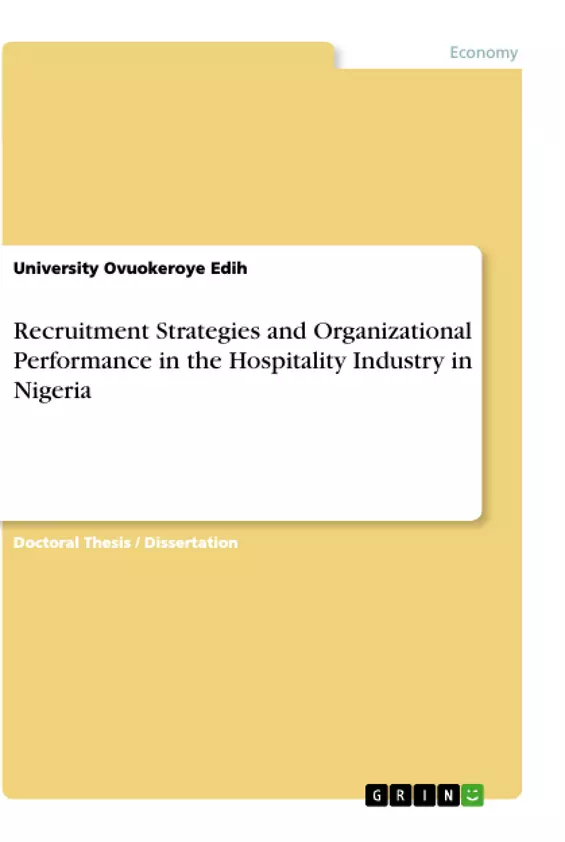The study examined recruitment strategies and organizational performance in the hospitality industry in Nigeria. The main objective is to examine the effect of recruitment strategies on organizational performance in the hospitality industry in Nigeria. Literatures were reviewed in the context of conceptual review, empirical review and theoretical review. The study adopted a cross- sectional survey design to sample a fair representation of the target population. It made use of both primary and secondary data. Structured questionnaire was used to generate primary and five- point Likert scale and five hypotheses were drawn for the study. Interview was also conducted to corroborate responses gathered through questionnaire. Taro Yamane’s sample size formular for finite population was adopted by the study. The five hypotheses were tested using multiple regressions analysis at 0.05 level of significance and statistical packages for social science (SPSS) version 20 was used to analyze the descriptive data. Findings showed that, job advertisement, selection interview, referral and private employment agencies had positive and significant effect on organizational performance while host community recruitment did not show significant impact on organizational performance. Reason was that hotels in Nigeria have not recruited staff through the host community recruitment window in spite of its peaceful business ideals. Results from the regression analyses showed that job advertisement had a statistical significant effect on organizational performance with (coefficient =0.406, p=0.00<0.5), employee’s referral recruitment had a significant effect on organizational performance with ( coefficient =0.473, p=0.000<0.05), employment agencies also had significant effect on organizational performance with (coefficient = 0.4735,p=0.000<0.05), Selection interview demonstrated a significant effect on organizational performance with (coefficient =0.545, p=0.000<0.05) while host community recruitment did not have significant effect on organizational performance as shown by (coefficient =0.592, p=0.051>0.05). The study concluded that recruitment strategies significantly affect organizational performance in the selected hospitality firms. [...]
Inhaltsverzeichnis (Table of Contents)
- Chapter One: Introduction
- 1.1 Background to the Study
- 1.2 Statement of the Problem
- 1.3 Objectives of the Study
- 1.4 Research Questions
- 1.5 Scope of the Study
- 1.6 Significance of the Study
- 1.7 Limitations of the Study
- 1.8 Definition of Terms
- Chapter Two: Literature Review
- 2.1 Conceptual Framework
- 2.2 Theoretical Framework
- 2.3 Empirical Review
- Chapter Three: Research Methodology
- 3.1 Research Design
- 3.2 Population of the Study
- 3.3 Sample and Sampling Technique
- 3.4 Instrumentation
- 3.5 Data Collection Procedure
- 3.6 Data Analysis Technique
- Chapter Four: Data Presentation, Analysis and Interpretation
- 4.1 Data Presentation
- 4.2 Data Analysis
- 4.3 Interpretation of Findings
- Chapter Five: Summary of Findings, Conclusion and Recommendations
- 5.1 Summary of Findings
- 5.2 Conclusion
- 5.3 Recommendations
Zielsetzung und Themenschwerpunkte (Objectives and Key Themes)
This Ph.D. thesis aims to investigate the relationship between recruitment strategies and organizational performance within the hospitality industry in Nigeria. It seeks to understand the effectiveness of different recruitment methods and their impact on key organizational performance indicators.
- Impact of recruitment strategies on employee retention and turnover
- Relationship between recruitment practices and customer satisfaction
- Influence of recruitment strategies on organizational productivity and profitability
- Challenges and best practices in recruitment within the Nigerian hospitality industry
- Recommendations for optimizing recruitment strategies to enhance organizational performance
Zusammenfassung der Kapitel (Chapter Summaries)
- Chapter One: Introduction This chapter provides an overview of the research topic, outlining the background, problem statement, objectives, research questions, scope, significance, limitations, and definitions of key terms.
- Chapter Two: Literature Review This chapter presents a comprehensive review of existing literature related to recruitment strategies, organizational performance, and the hospitality industry. It explores relevant theories and empirical findings, establishing a theoretical foundation for the research.
- Chapter Three: Research Methodology This chapter details the research design, population, sample selection, instrumentation, data collection procedures, and data analysis techniques employed in the study.
- Chapter Four: Data Presentation, Analysis and Interpretation This chapter presents the collected data, analyzes the findings, and interprets the results based on the research questions and objectives. It provides a comprehensive overview of the relationship between recruitment strategies and organizational performance within the Nigerian hospitality industry.
Schlüsselwörter (Keywords)
The research focuses on recruitment strategies, organizational performance, hospitality industry, Nigeria, employee retention, customer satisfaction, organizational productivity, profitability, challenges, best practices, and recommendations.
Frequently Asked Questions
How do recruitment strategies affect performance in Nigeria's hospitality industry?
The study shows that strategies like job advertisements, selection interviews, and referrals significantly improve organizational productivity and customer satisfaction.
Which recruitment method was found to be most effective?
Selection interviews demonstrated a high significant effect (coefficient = 0.545) on organizational performance in the analyzed Nigerian firms.
What is "host community recruitment"?
It is a strategy of hiring staff from the local community where the business is located; however, the study found it currently has no significant impact in Nigeria's hotel sector.
What are the main objectives of this Ph.D. thesis?
To examine the effect of recruitment methods on employee retention, customer satisfaction, and overall profitability in Nigeria's hospitality sector.
What research methodology was used?
A cross-sectional survey design using questionnaires and interviews, analyzed with multiple regression and SPSS version 20.
- Quote paper
- University Ovuokeroye Edih (Author), 2021, Recruitment Strategies and Organizational Performance in the Hospitality Industry in Nigeria, Munich, GRIN Verlag, https://www.grin.com/document/1161839



